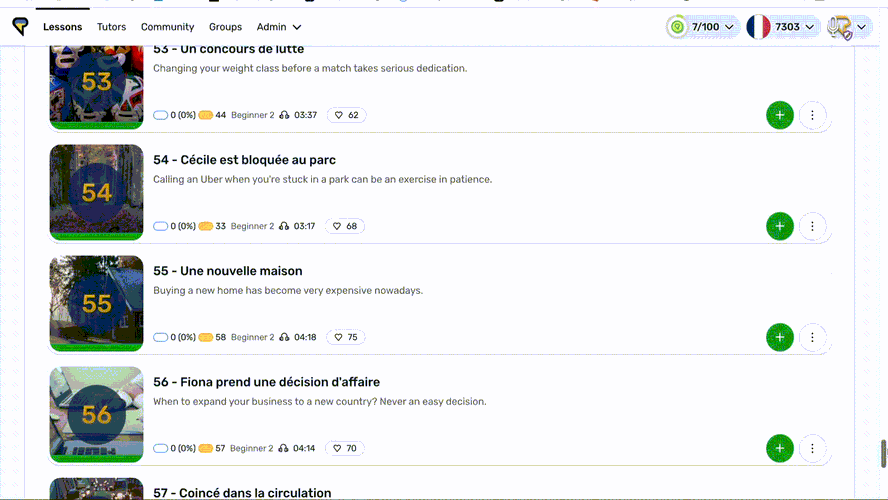TL;DR Summary
When I started learning French, I didn’t understand much, but I kept listening and reading anyway. At first, it all sounded like one long stream of sound. Slowly, words began to separate, and things started to make sense. I never forced grammar — it came naturally after enough exposure. The main thing is to enjoy the process and stay with it.
***
There’s an expression in French: “On revient toujours à son premier amour.” You always come back to your first love. French was one of the first languages that I learned. While I love all of the languages that I’ve studied, but I’ll always have a special affection for French.
My Introduction to French
I grew up in Montreal in the 1950s and studied French every day in school from grade two through high school. After ten years, I still couldn’t hold a conversation or understand spoken French.
This was typical. Despite being a good student and passing all the grammar tests with high marks, I couldn’t speak the language. I struggled to form sentences and had no real comprehension. I never read French newspapers or watched French movies—I simply couldn’t understand them.
Unfortunately, this is still common in Canada today. The ability of English Canadians to speak French remains low and has even declined in recent years. Schools focus heavily on verb conjugations, agreement rules, and reflexive forms—but students still can’t speak. Why? Perhaps it’s precisely because of how it’s taught.
By grade three, I could recite all 16 verbs that use “être” as their auxiliary verb. But by grade 11, I still couldn’t converse in French. Yet, I eventually became fluent, attended a top French university, and developed a lifelong love of the language.
So what changed? And what can beginners learn from my experience?

The Best Way to Learn French: Get Interested!
The simplest advice for learning French? Develop a passion for it. I once wrote a blog post called Why Learn French? Six Reasons. But passion can’t be forced—it’s usually personal. Still, as the French saying goes, “L’appétit vient en mangeant” (the appetite comes with eating). Sometimes you just need to get started.
In that earlier article, I wrote:
“To paraphrase Tolstoy, all happy language learners resemble each other. They develop a passion for the language they are learning. Each unhappy language learner finds their own reason to give up.”
That’s been true in my case—my love for French has lasted over 50 years.
Every language has its challenges. It takes time to adjust to a different system of expressing thoughts and emotions—one shaped by another culture. Staying motivated is essential.
The Hungarian polyglot Kato Lomb once said that success in language learning is motivation plus time, divided by inhibition. I would replace “inhibition” with “resistance.” Inhibition is one kind of resistance—but frustration with how languages are taught is another, and perhaps an even bigger obstacle.
If you’re struggling, try shifting your focus from perfection to passion. Start small, stay curious, and let your interest grow over time.
French for Beginners – What You Need to Know
There is too much emphasis on grammar in French instruction, and I believe this is unhelpful. We need to immerse ourselves in the language right away by listening to and reading stories. Initially, these texts should be short and full of repetition. I recommend the Mini Stories at LingQ. The Mini Stories will guide you towards an intermediate grasp of French. Practice the basic patterns of the language with lots of repetition. Refresh your knowledge of important sentence structures and grammatical patterns. Then, as soon as possible, the immersion should consist of compelling content, audio with text.

Accessing this kind of material is made possible thanks to the Internet. Whether you enjoy listening to French YouTubers, podcasts, or reading blogs, the amount of content you can find is endless. Francais Authentique and innerFrench are great resources. None of this existed during Kato Lomb’s time, nor when I was learning French 50 years or more ago.
Don’t Get Discouraged by Grammar
French grammar can be complex. Every language has its complexities. However, don’t base your success on your ability to memorize conjugations or rules. These patterns take time to internalize. Grammar can help us polish and refine our speech, but it’s not a foundation. Refer to grammar guides (LingQ has a free French grammar guide) to satiate your curiosity, but prioritize daily contact with the language and enjoying the process.
A Guide to French for Beginners
Pronunciation
French pronunciation can be tricky at first. The tones are flatter than in English, and the nasal vowels can sound almost identical to new learners. Add to that the “liaison”—where the end of one word blends into the next—and it’s no wonder French can feel like a blur in the beginning. But with enough exposure, your brain will adapt.
These features can be frustrating, but don’t worry. The language won’t change for you—you’ll change for the language. Over time, and with regular listening, you’ll start hearing where words begin and end. Eventually, you’ll be able to reproduce the sounds yourself. Again, it’s a gradual process, so patience is key.
French Speakers Often Struggle with English Too
If it helps, French learners struggle with English too. French only has about three distinct pitch patterns, while English has seven or more. So just as French speakers must adjust to the “sing-song” rhythm of English, English speakers must learn to tone it down when speaking French.
One simple tip for sounding more French? Get used to the “euh” sound—heard in words like je, le, and me, and at the end of many words. It’s also used like “um” or “uh” in English, as a verbal pause. Mastering that small sound can make your speech feel more natural and help you blend in better with native rhythms.
With time, listening, and patience, even French will start to feel familiar.
Positive statements, negative statements and questions

You have to get used to what in English we call the ‘w’ words: what, where, when, why, who, how: “quoi” , “où” , “qui” , “quand” , “pourquoi” , “comment”. You should get used to those at the beginning of your studies, as they are essential for making statements and asking questions. Try Google Translate to see what the corresponding words and structures are in French to questions you have in English.
In fact, you should get in the habit of Googling whenever you have a question about French, including grammar issues. It is far more effective to search for an answer to something that you have noticed in the language that you are curious about, rather than having a teacher push an explanation at you.
When you see question words in your reading at LingQ, save them. You should do this not only to remember these words, but because the LingQ system will give you lots of examples of these words in use. The examples usually come from lessons you have already studied. The advantage of looking at examples from lessons you have already studied is that you probably know the words. Very often, if you’re reading in a grammar book you are provided with examples, where you don’t know the words. That’s not so helpful.

Gender and Number
There are languages, like Japanese, that have no gender and no number. French has both. In French, pronouns and adjectives have to agree, even verbs have to agree. For a quick explanation you can Google. In the case of verb agreement in French, you may want to go to Lawless French . It tells us that:
“Accord du verbe. In French, the past participles in compound tenses and moods sometimes have to agree with another part of the sentence, either the subject or the direct object. It’s a lot like adjectives: when an agreement is required, you need to add e for feminine subjects/objects and s for plural ones.”
There are abundant grammar resources on the web. Find the ones you find most useful and use them when you are curious about something. Getting used to new grammar patterns takes time. You don’t learn it the first time, not even the fifth time. But eventually it becomes second nature, believe me.
Advice to Learn French Verbs
Very soon you’ll discover that whereas in English verb forms don’t change much for person, in French every form of the verb changes, depending on the person, and tense and “mood”. We call these verb changes, the different conjugation forms of verbs. It’s very difficult to remember these conjugations. You can spend all kinds of time pouring over conjugation tables. In my experience it’s a very unsatisfying thing to do because you forget them. You might remember them for tomorrow’s test and then you forget them, so you constantly have to refer to them and see them in context.
If you’re on the computer, just Google “French conjugations” or “conjugation” of any verb and you will find what you are looking for. The same is true, by the way, with pronouns, adjectives. Anything you want to look at, you just Google and it will be there.
There are even conjugating dictionaries like Le Conjugueur and Context Reverso. These are two of the dictionaries that you can use at LingQ. Don’t rely on memorization. Keep reading and listening. Look things up when you are stumped and stay focused on things of interest.
Also, here’s a short list of common French verbs to help get you started.
Tips for Conditional and Subjunctive
Some people are intimidated by these verb forms or moods in French, without realizing that we have the same patterns in English. The English conditional, of course, revolves around the word “if”, as in the sentence “I would go if…” etc. The same is true in French with the word “si”. Type some “if” sentences in English into Google Translate to see how French deals with this issue.
The subjunctive is used when there is uncertainty about whether something is going to happen, as in “you have to go”, “I want you to go”, “although you went” etc. Begin by noticing the subjunctive. Don’t worry about whether you can get it right when speaking or writing. Save the subjunctive form of verbs when you think you might have come across it at LingQ. Check it out in Le Conjugueur or in another conjugating dictionary like Context Reverso. Both of these dictionaries are available at LingQ.
You will slowly get more and more used to the conditional and the subjunctive. Continue your enjoyable discovery of French, through listening and reading, and your confidence in these seemingly scary looking verb forms will gradually grow.

There are many things they do differently in French. The French are not hungry or cold, they have hunger and they have cold. They have age, and they say “ I call myself” instead of “my name is”. At first these patterns seem strange because they are different from what we are used to. Don’t be put off, and don’t try to nail these things down. Take note, observe, discover, and move on.
Final Thoughts:
I have touched lightly on some of what you will find in French. Don’t put these things up front. Don’t think that the mass of grammar rules need to be mastered before you can enjoy the language. That is what they did to me in school. It was when I broke away from that, and immersed myself in content of interest, reading, listening, watching movies, and conversing with people, that I started to fall in love with French. That stimulated my motivation, reduced my frustration, and induced me to spend the time necessary to achieve fluency in this lovely language, “mon premier amour” among languages.
FAQs
1. How do I keep learning French when I feel stuck?
Plateaus are normal. Add some variety to your learning. Switch up your input with new podcasts, different accents, or a new topic you’re curious about.
2. Should I focus on one accent or learn multiple?
I’m not sure that this matters. This depends on your circumstances. In general, as a language learner, why specialize when you can diversify and understand French wherever it’s spoken?
3. When should I speak French?
My advice, especially in the beginning, is to listen far more than you speak. Speaking draws from language you acquire through reading and listening.
4. Can I learn French without living in a French-speaking country?
Yes—immerse digitally. Create a “French world” online: YouTube channels, Netflix shows, social media feeds, and audiobooks.
5. What’s the fastest way to remember new words?
Meet them often in contexts you enjoy. The brain remembers stories and emotions better than isolated lists. A way to ensure that you’re constantly coming across words again and again is to immerse yourself in French on LingQ daily.
Here you can read a post about ¨French pronunciation guide¨
Planning a trip to France? Check out this LingQ blog post to learn some fun French pick up lines!







18 comments on “French for Beginners: What You Need to Know”
Comments are closed.
I remember you mentioned that Youtube comment response system is really messing up. So I put my question that asked on YouTube too! I really lookforward to your responce!
Hello Steve! Could you tell us what is the best books for learning French if you never mind? I bought a book “teach yourself” series once before. I think should learn with audio when it comes to a new language that is not used to hear yet. I mean, the most effective porocess of learning a new language is listening, but more idealy saying, to follow each word at the same time when do listening as my personal perception! So I would ask you the good book which has audio if you have had something recommendable one ! And where could I get colloquial series which you often introduce? Thank you for reading^^
Any starter book is fine, Teach Yourself, or Colloquial or a Japanese book. Then get on LingQ to really move to the next level. Good luck.
Steve
Dear Mr steve.
Recently I sent a message to you on facebook. But that message is hard to notice because of that notification system,,,So I put my massage here. Sorry for out of place.
In short, thank you always and I created 3D portrait of you. Hope you like it!
Interesting. While technically French was my first foreign language, I hadn’t studied it until last year, though I had been in touch with it since I was a kid (both my parents had studied French language in college).
When it comes to language learning, though, my first love was and is English. I always come back to it, and I’m always happy to do so.
Appreciated. Very informative . I trying learning French and i dropped on the way, after reading this article have changed my mind i will go back and finish.
Go for it.
Hi Steve
I have been learning french for the past few years and feel I am making good progress…except when it comes to understanding spoken french. I can make myself understood in french but am generally lost if they respond with anything more than a few words. What do think is the best way to improve comprehension in french – is it particularly difficult or just me?
Thanks
Brendan
There is no easy answer. You just have to keep going. Do a lot of listening and reading. Books, audio books, things that interest you. Try LingQ. Good luck.
I’m impressed with Duolingo. It has helped massively with learning vocabulary and after just 5 months (Although I did have 2 hours a week at school) I’m delighted how much of the written language that I can understand. I’ve now joined a ‘Parlons Francais’ group where novices learn from fluent speakers by conversing visage a visage. C’est tres aider.
If you read this blog before you start learning French, it will help you a lot. It gave me a clear idea of what to look for while learning French. This Blog made the process of learning French much easier. It’s an informative blog to read and learn about French language, especially for beginners.
Excellent !
Bon site, bravo !
this was a great article it inspired me to learn french. i also grew up in 1950 but i live in ontario. Thanks Steve.
My sister wants to go to Paris and speak French fluently. It was explained here that she should develop a passion for French when starting to learn it. In addition, it will be ideal to go to professionals and enroll in French language classes.
“You have to get used to what in English we call the ‘w’ words: what, where, when, why, who, how: “quoi” , “où” , “qui” , “quand” , “pourquoi” , “comment”.”
sorry i’m definitely no expert, but isn’t it “quoi, où, quand, pourquoi, qui, comment”?
Thanks for sharing this Great article
I appreciate the valuable time you have used to share this.
Thanks for the very informative explanation!